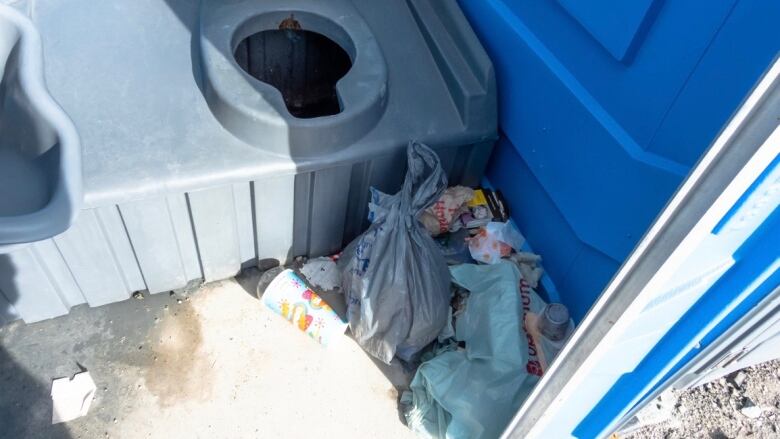Squamish 'overwhelmed' by people living in vehicles and the garbage left behind, says acting mayor
Campsites are full in the popular outdoor playground so visitors camp wherever they can

The growing number of people living in vans and RVs around Squamish, B.C., is putting too much pressure on the community's facilities, according to acting mayor John French.
The District of Squamish, about an hour's drive north of Vancouver, is a destination for many outdoor enthusiasts, from rock climbers, to mountain bikers, hikers, and kite surfers, many of whom travel and sleep in vans and RVs.
But with limited campground spaces, and ever-increasing interest in the area, people are left to find spots that aren't meant for camping, and some are leaving garbage and human waste behind.
"In the peak of summer, the number of people coming to our community is significant and well beyond the infrastructure that we have here — to have everybody camping properly and managing themselves in a camping setting the way that they should be," said French.
"It's really upsetting to the residents who live here," he said.
French estimated there are about 700 designated campsites in the area, but they're all regularly full.
"I think it's safe to say that it's hundreds of vehicles, and hundreds of people that are camping in areas that are not designated for camping," he said, adding that places like Spit Road, a beautiful part of town that juts into Howe Sound alongside a sensitive estuary, have become hot spots.

Complaints from residents have included noise, but French said this year, after a bit of a lull due to the pandemic, the number one issue is garbage and human waste.
"Folks who are coming to Squamish for adventure need to be prepared to take care of their own waste," he said. "Because we're overwhelmed with visitors every summer."
He said there are toilet and garbage facilities at Spit Road, but he admits that's not enough for the demand.
Local residents versus visitors
Thomasina Pidgeon is a Squamish resident who lives in a van and advocates for the community through the group, Vehicle Residents of Squamish.
According to Pidgeon, there's a distinction to be made between the longer-term vehicle residents and the tourists who pass through town, and she's unhappy that messes left by a few people are being blamed on the broader group.
"There are a lot of visitors in Squamish, and a lot of them do not practice 'leave no trace.' They leave a lot of garbage, and unfortunately vehicle residents get the blame for most of it," she said.
But in terms of a solution to overflowing garbage bins, she thinks the answer is clear.
"This year, I've noticed that there aren't as many toilets where they were last year. So if there's an increase in garbage and waste, I mean, put some more toilets and put some more garbage cans," said Pidgeon.
French doesn't see it that way.
"Yeah sure, the district could do more, but really, from my perspective, this is a personal responsibility issue," he said.
The acting mayor said there is a strategy in place to step up bylaw enforcement in the problem areas and escalate from an education approach to enforcement when necessary.
According to Pidgeon, bylaw enforcement doesn't help the permanent residents living in vehicles, many of whom have been forced there by the high cost of housing in Squamish.
"If Squamish wants to be seen as an inclusive place, they need to have inclusive solutions, and that does not include a bylaw that punishes people for sleeping," she said.

In terms of creating more space for the growing number of visitors and those already living in vehicles in town, French said the district has no plans to take that on.
The 35-site municipal campground at Brennan Park is closed and is only available during special events.
French hopes the people who visit Squamish can remain respectful and considerate with how they handle themselves, and their waste.